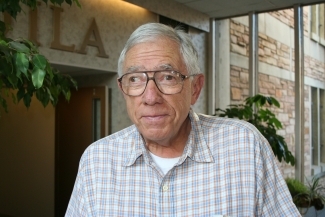On December 8th, JILA and NIST Fellow Dr. Judah Levine spoke on his research into internet time service. Internet time service is based on atomic clock technology and is used to help set computer clocks and other devices. The virtual event was hosted by Executive Director Dan Powers of CO-Labs, a coalition of 30+ federally funded Colorado research labs, including JILA. Levine's talk was one in a series discussing the ROI of scientific research.
Levine spoke at length about his previous work on atomic clock time precision, which led to him receiving a Governor's Award in 2009. Levine's research has helped to make time precision more publicly accessible. This in turn has allowed the technology to be used in GPS devices, as well as for digital financial transactions. In his talk, Levine mentioned his future work in developing optical fiber services for higher accuracy. "There are some things that haven't changed about internet time services," he said. "For example, the widespread use of GPS hasn't really changed. The internet time service has gotten a little bit better, but in many ways, it's limited by the increased congestion on the network. That's one of the reasons why the optical fiber circuits are becoming the next step." The circuits Levine and his lab are working on would be used specifically for telecommunications or the stock exchange.
The technology of atomic clocks is not only helpful in internet devices but many other types of technology. Levine's research shows the adaptation of laboratory research to keep up with the modern internet's needs. As time progresses, technology will continue to evolve to expand and refine our internet.
To learn more about CO-Labs, click on the link here.



 The Physics Frontiers Centers (PFC) program supports university-based centers and institutes where the collective efforts of a larger group of individuals can enable transformational advances in the most promising research areas. The program is designed to foster major breakthroughs at the intellectual frontiers of physics by providing needed resources such as combinations of talents, skills, disciplines, and/or specialized infrastructure, not usually available to individual investigators or small groups, in an environment in which the collective efforts of the larger group can be shown to be seminal to promoting significant progress in the science and the education of students. PFCs also include creative, substantive activities aimed at enhancing education, broadening participation of traditionally underrepresented groups, and outreach to the scientific community and general public.
The Physics Frontiers Centers (PFC) program supports university-based centers and institutes where the collective efforts of a larger group of individuals can enable transformational advances in the most promising research areas. The program is designed to foster major breakthroughs at the intellectual frontiers of physics by providing needed resources such as combinations of talents, skills, disciplines, and/or specialized infrastructure, not usually available to individual investigators or small groups, in an environment in which the collective efforts of the larger group can be shown to be seminal to promoting significant progress in the science and the education of students. PFCs also include creative, substantive activities aimed at enhancing education, broadening participation of traditionally underrepresented groups, and outreach to the scientific community and general public.